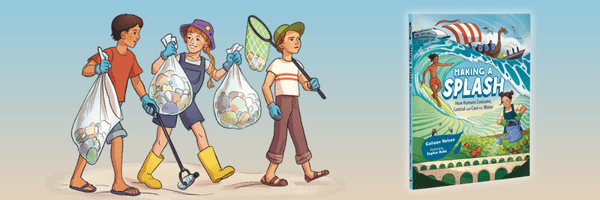Part of the nonfiction Orca Timeline series for middle-grade readers, Making a Splash explores our relationship with water and how we use, control and take care of it. Hear from author Colleen Nelson on what inspired her to write this book and
What inspired you to write a book all about water?
It doesn’t sound like the most exciting topic, does it? That’s what I thought before I started teaching grade 8 social studies. Part of the course is on river valley civilizations like ancient Egypt and Mesopotamia. My teaching partner, Alex McGavin, and I developed an inquiry project to ask students: What has had a bigger impact: humans on water or water on humans? That was the seed for this book! I saw how many ways water and humans interact and wanted to explore it further.
Why do you feel this topic is important for young readers?
Water is truly the thing that connects us. Not only do we need to drink it to survive, but it physically connects us through travel and spiritually, too. I begin the river valleys unit asking for a list of all the ways we need water. It doesn’t matter where you are or when you live, water is essential for your existence. So, there’s that, but also, as a teacher, I see the eco-anxiety that young people (and older people) deal with. I wanted this book to show a realistic portrayal of how valuable water is and the ways we’re misusing it, but also all the good that’s being done to protect it. I hope this book gives a balanced perspective that leaves young people feeling hopeful and more aware of why we need to conserve our most important natural resource.
What’s one cool or unexpected fact you learned while researching this book?
Oh my goodness, there were so many! One fact that sticks out the most, because it is shocking, is about who owns water. In Canada it’s owned by the government, but in the US, states can sell the rights to underground aquifers. In Michigan, the food and beverage company Nestlé bought water rights and continues to pay just $200 a year to access and bottle water from a natural spring. They bottle 100,000 times the amount of water the average resident uses and sell it for a lot of money—like millions of dollars!
The reason I started to investigate this idea was because I met an amazing author and activist named Maude Barlow at a book festival a few years ago. She was explaining the work she did to ensure that water didn’t become a commodity since it’s necessary for life and having equal access should be a human right. She was one of many water warriors I learned about while writing this book.
Your book features bright and fun illustrations by Sophie Dubé. Do you have a favorite illustration or spread?
My jaw dropped when I saw the color illustrations for the first time. Each of the nine chapters has a title page where Sophie has integrated some images from the chapter in very clever designs. For example, the spirituality chapter has a whirlpool, and the exploration chapter has a maze. The colors leap off the page! My favorite illustration is one that is based on a photo of my niece and nephew. We were at their cottage and the kids were jumping off the dock. I snapped a photo and thought it would be good to include in the book. Instead, Sophie used it as inspiration for an image. I love that they are immortalized in Sophie’s art.
What do you hope readers will take away from Making a Splash?
Mainly that we need to value water. In our industrialized world, we take it for granted. Learning about the way other cultures around the world and in history have honored and treasured it gave me a more global perspective. Around the world Indigenous people are standing up for water by fighting against oil companies in the Amazon and demanding governments give sacred bodies of water the same rights as people so they can be protected. It’s inspiring to see what a shift in mindset can do to motivate people to make change.
What’s next for you? Are there any other topics you’re ready to dive into?
Thanks for asking! I just finished the manuscript for a nonfiction book on worldview that I’m very excited about! Again, it’s a topic that I teach, and I’ve always wished I had a resource that explored what influences the way we look at the world. It’s out in 2027 with the Orca Think series, and I’m so excited to see how it comes together.

Colleen Nelson is a teacher and author. Her recent titles include the Mystery at the Biltmore series, The Umbrella House and 2023 Silver Birch winner The Undercover Book List. Colleen has lived in Japan and New York City and currently lives in Winnipeg where she dreams of having a home by the ocean.


